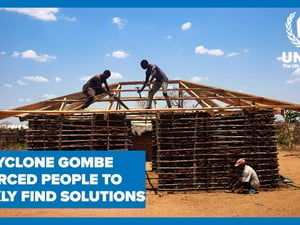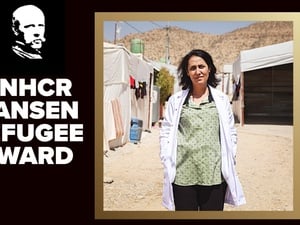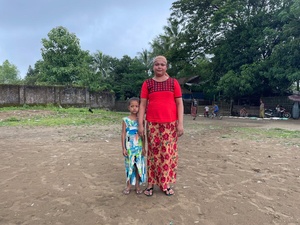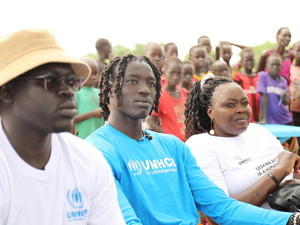Hope becomes a reality for displaced Sri Lankans in resettlement programme
Hope becomes a reality for displaced Sri Lankans in resettlement programme
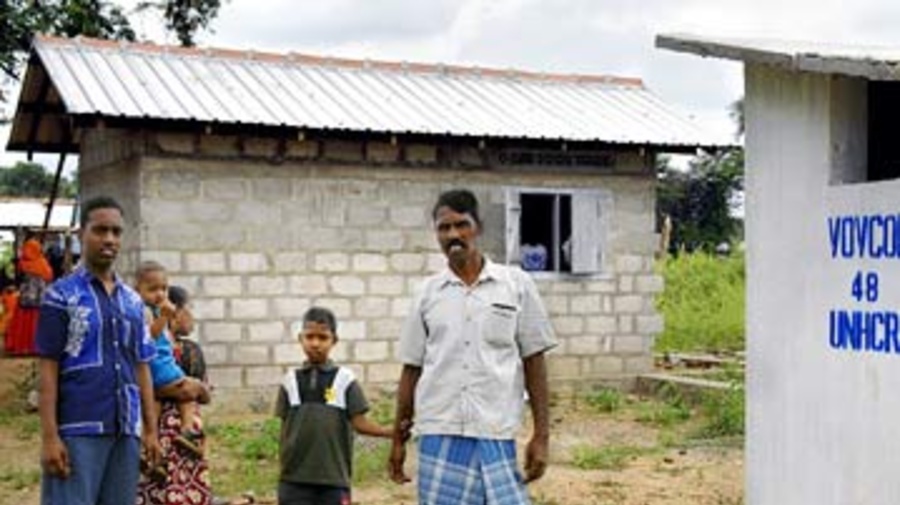
A Sri Lankan family outside their new home in Muthunagar, north-east Sri Lanka. UNHCR is helping this family and 177 others as part of a resettlement programme for displaced people living with host families in the Trincomalee district.
MUTHUNAGAR, Sri Lanka, March 14 (UNHCR) - A. A. Mohommed cannot conceal his delight as he shows visitors round his new home, but despite his joy he also worries about his childrens' future as fighting again wracks Sri Lanka.
"It's difficult to believe that we are finally standing inside our very own house. My boys will finally have a proper home," the crippled 40-year-old tractor driver says, with his two year-old son under his arm and a big smile on his face.
His wife, Siththi Masaira, walks in with their three other sons in tow. She opens the windows to let out the warm air trapped inside their house in Muthunagar, located 15 kilometres away from the port of Trincomalee in north-east Sri Lanka.
Muthunagar is the site of UNHCR's latest resettlement programme in the Trincomalee district. Implemented by the Rural Development Foundation, the scheme assists 178 families who were displaced in 1990 by the conflict between government forces and the Liberation Tigers of Tamil Eelam (LTTE).
Mohommed and others in the scheme had been living with host families. They were among the estimated 465,000 people displaced by the fighting, including 223,000 people who have fled their homes since the violence flared in April last year after four years of relative calm following the 2002 ceasefire.
For much of the past 17 years, Mohommed has lived in a house belonging to his in-laws a few kilometres from his original home. He earns 600 rupees (US$6) a day driving tractors, while the family also receives a 360-rupee monthly allowance under the government's poverty alleviation scheme. But with six mouths to feed and education expenses, saving for a house was simply a dream.
"I never thought this would be possible. I always hoped to return to Muthunagar and build my own house, but how often do hopes become a reality, especially because of this," says Mohommed, lifting his sarong to show the prosthetic limb he has worn since losing his left foot after stepping on a landmine in 1989.
Mohommed already knows some of his new neighbours - three of his seven siblings and their families are also resettled at the site. UNHCR has given each family a 200-square-foot house complete with a separate latrine and half-an-acre of land for cultivation. The 500-square-foot foundation the house is built on allows the owners to expand their abode safely.
More than seven kilometres of access roads and internal roads have been cleared, while water and sanitation facilities are being upgraded. UNHCR is trying to secure the assistance of other agencies to build a school and community centre.
Mohommed's happiness is tinged with apprehension about the future. "Now that my hope for a home is fulfilled, I can focus on educating my children. But I really fear for their safety, especially my eldest," he says, looking at 14-year-old Azeez.
His concerns are understandable. With last year's upsurge in fighting, there has been an increase in the number of kidnapping and abduction cases, particularly in the north and east. "When he attends classes after school, my wife panics if he is late by even a few minutes. That is the kind of environment we live in," Mohommed says.
For now, the family is focusing on making a good life for themselves in their new home in Muthunagar, hoping that they will not be forced to leave again. The fear and uncertainty they experience is a constant and has become a way of life that can only be erased with a lasting peace in Sri Lanka.


